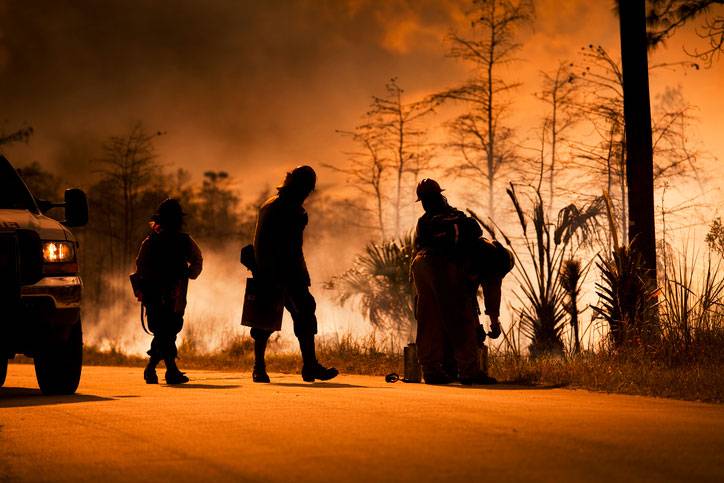
The appearance of U.S. Department of Defense (DoD) visual information does not imply or constitute DoD endorsement.
Public safety administration is one of the most demanding and least forgiving jobs in modern American society. When wildfires flare, hurricanes strike, or earthquakes shatter the ground, public safety administrators are on the line to save lives and protect property.
Protecting and defending comes naturally to veterans. It’s what you did, in whatever role you held, for however long you were in the service. And many vets come away from the military with their commitment to national and community protection stronger than ever.
A career in public safety administration is a natural fit for anyone who has that in their blood. But in an increasingly complex, professional field, college degrees are more important in those careers than ever.
Explore Your Military Training and Degree Options
Natural Disasters Will Test the Boundaries of Public Safety Systems for Decades To Come
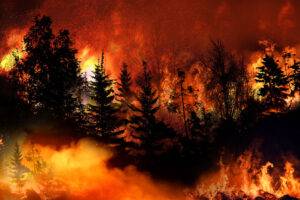 Ten acres were already blazing by the time Cal Fire Captain Matt McKenzie laid eyes on the fire. He knew instantly it was going to be bad. Burning in inaccessible terrain, the winds that drove it also made it too risky for air attack. In November, it was late in the season for a major fire. But McKenzie had a bad feeling.
Ten acres were already blazing by the time Cal Fire Captain Matt McKenzie laid eyes on the fire. He knew instantly it was going to be bad. Burning in inaccessible terrain, the winds that drove it also made it too risky for air attack. In November, it was late in the season for a major fire. But McKenzie had a bad feeling.
Evacuations began in nearby towns like Concow, Pulga, and Paradise within the hour. A reverse emergency alert system called CodeRed was activated to ping resident cell phones. But the fire had already burned over many cell towers. It was moving too fast—and there weren’t enough roads out.
Within six hours, the town of Paradise had been all but erased from the map. Nearly 6,000 firefighters, 100 bulldozers, and 24 helicopters responded from 17 states, but the nightmare had already happened. Nearly 19,000 structures were destroyed and 85 people were dead.
Camp was uniquely tragic, but typical of modern disasters. It required massive coordination and tested plans made decades before. It also caused a media firestorm over planning, management, and responsibility.
To date, the Camp fire has been the most destructive and deadly fire in California history. But with decades of epic drought drying the land and a full line-up of potential national disasters on deck, the state is more in need than ever for public safety administrators to prevent and defend against the next incident.
What Does a Career in Public Safety Administration Involve?
 Public safety is a field that includes law enforcement, but it has a far broader reach than that. There are careers in the fire service, security, emergency management, health, emergency medical services, and more with one of these degrees. And many PSA jobs live in the broad canopy that oversees all those services, connecting the various functions of emergency aid with city planning, preparedness, and public health.
Public safety is a field that includes law enforcement, but it has a far broader reach than that. There are careers in the fire service, security, emergency management, health, emergency medical services, and more with one of these degrees. And many PSA jobs live in the broad canopy that oversees all those services, connecting the various functions of emergency aid with city planning, preparedness, and public health.
But these aren’t the same as the front-line positions that most people think of being associated with those services. Administration instead focuses on strategic, logistical, and policy matters. You can think of public safety administrators as being the generals and admirals of civilian health and life-safety organizations.
These are jobs that require keeping a lot of plates spinning at once. Public safety administrators are often responsible for:
- Budgeting and procurement
- Disaster planning and management
- Policy recommendations
- Technology evaluation
- Public and private agency coordination
And when things hit the fan, it is often PSAs who are on the phones and radios, working at a high level to get more shovels and more help shutting that fan down.
You’ll typically find PSA jobs in government, but big non-profits, particularly those in disaster relief, and major companies also sometimes need experts in public safety administration.
What Are Salaries Like in Public Safety Administration?
The job titles under which public safety administrators actually work can vary with their specialty or just the particular setup of the company or agency they work for. Most PSAs work for governments, in roles such as:
Emergency Management Directors – $76,730
State, local, and federal agencies hire dedicated public safety administrators to plan and lead safety organizations in their region with a variety of specialties.
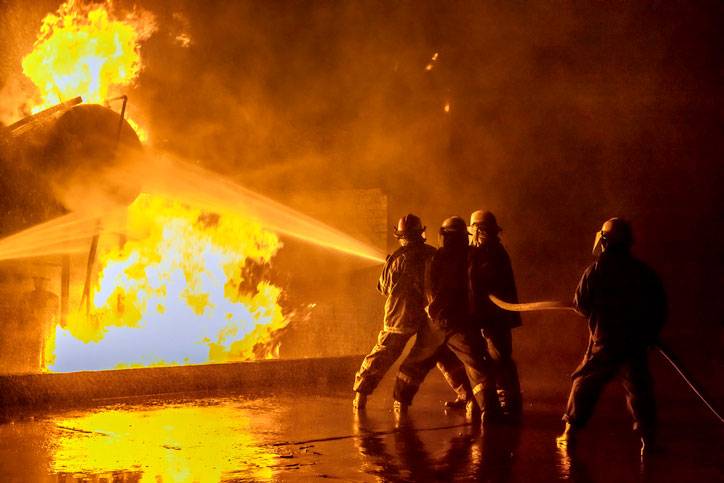
Firefighters – $81,640
Fire chiefs and assistant chiefs as well as commissioners and other department leaders often pick up public safety administration degrees along the way to those positions. This number represents the top ten percent of the profession.
Police and Detectives – $105,540
Police chiefs and commanders, particularly in large departments, also find PSA degrees helpful in their role as managers and leaders. This number represents the top ten percent of the profession.
Public Safety Telecommunication – $63,940
Communication is a key piece of disaster and safety response today. Managers of major communication centers may choose a degree in public safety administration to hone their coordination and leadership skills. This number represents the top ten percent of the profession.
In the private sector, most of the different roles that a graduate with a public safety admin degree might hold are lumped into the overall category of Top Executives. For 2021, the salary in those jobs was $98,980 per year.
Nobody Administers Safety Like the American Military
When you see a formation of gung-ho Marines running in full pack and body armor, armed to the gills, the fiercest warriors America has ever produced, and every single one of them is wearing a bright yellow reflective belt over their camouflage uniforms, you know right away you’re dealing with an organization that takes safety seriously.
In fact, in CONUS bases around the United States, or in other secure parts of the world, it can sometimes seem like safety is the only important thing. You’re likely to sit through endless safety briefings that may last longer than the training evolution they cover. Heck, there’s still a UCMJ regulation on the books outlawing dueling in the ranks.
The American military has become a connoisseur of safety. And that’s a great thing if you are inclined to pursue a civilian career in the field.
Military Force Protection and Coordination Roles Offer the Best Preparation for Public Safety Jobs
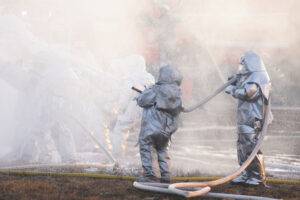 In general, any role as an officer or NCO is going to deliver quite a lot of the practical skills you will need as a public safety administrator. The ability to organize, plan, and command are all key parts of the business.
In general, any role as an officer or NCO is going to deliver quite a lot of the practical skills you will need as a public safety administrator. The ability to organize, plan, and command are all key parts of the business.
That means you’ll want to get to work earning those stripes or bars—the leadership training that comes with them will be invaluable.
But there are also a handful of Military Occupational Specialties (MOS) that have safety as job one.
Military installations have their own little world of public safety concerns. This is a responsibility of garrison host units, which sometimes create their own departments of public safety to fulfill those needs.
Assigned to those units, military police and firefighters have force protection roles that give them unique insights into public safety. In fact, you’re going to look around your classroom when you go for a PSA degree in the civilian world and see a lot of cops and smoke eaters looking to polish up their resumes for a shot at promotion. Particularly if you want a public safety admin job in one of these specialties, you will need to have some ground-floor experience to get it.
On the organizational side, civil affairs specialists and officers often work on public safety issues in coordination with local governments and civilian aid and disaster assistance organizations. Or consider a job in acquisitions where you can learn about key public safety administration roles like:
- Program and contract management
- Acquisitions
- Testing and evaluation
Coast Guard Members Are Already in the Public Safety Administration Business
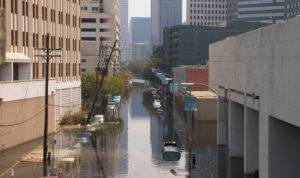 The Coast Guard, once again, offers a uniquely appropriate way to prepare for public safety administration jobs. As the national agency tasked with maritime response, it is one big public safety organization already. And both officers and enlisted ratings routinely coordinate with civilian public safety organizations.
The Coast Guard, once again, offers a uniquely appropriate way to prepare for public safety administration jobs. As the national agency tasked with maritime response, it is one big public safety organization already. And both officers and enlisted ratings routinely coordinate with civilian public safety organizations.
The largest single instance of this in recent history was in 2005, when Hurricane Katrina hit the Gulf Coast and devastated New Orleans.
Coast Guard staff had already developed a response plan, and pre-positioned units around the area before the storm hit. Within 12 hours of Katrina making landfall, fully 25 percent of the Coast Guard’s entire helicopter fleet were making rescues all along the gulf coast. When Navy assets arrived, they too were placed under Coast Guard control.
All in all, more than 20,000 people were rescued over a ten-day period… thanks to groundwork and coordination in public safety services laid on by Coast Guard personnel.
Any role in finance will get you comfortable with reading spreadsheets and preparing budgets, which is also a big part of public safety administration.
The granddaddy of all safety jobs in the American military might just be the Army’s 52B Nuclear and Counter WMD Officer.
National Guard and Reserve Service May Be the Best Path to Careers in Public Safety Administration
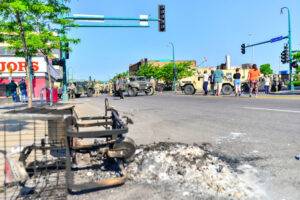 Public safety administration is one area where National Guard and reserve training can actually offer you more focused and relevant training than active duty service.
Public safety administration is one area where National Guard and reserve training can actually offer you more focused and relevant training than active duty service.
That’s because the Guard and reserves are where the phone rings when major public safety hazards come calling. Every year, Guard members leave their regular jobs and homes and are called up in states across the nation to respond to natural disasters:
- Wildfires
- Flooding
- Hurricane relief
- Pandemic response
Consequently, Guard and reserve units spend more time training for, and have more educational options, in public safety issues than active duty forces.
As a Guardsman or reservist, you may get the opportunity take FEMA ICS (Incident Command System) courses and get Red Card-qualified as part of your service. Just as important, you will probably, particularly as an officer, develop working relationships with local and regional public safety organizations. And you’ll often get on-the-ground experience in disaster response.
In short, there are a lot of different options you can use to your advantage to prepare for a career in public safety through the course of your service.
Degrees in Public Safety Administration Can Build on Your Military Experience
Because there is little formal training that is specific to public safety administration in the military, you’re going to need to jump on a degree program after you are discharged to get qualified in this career. Fortunately, there are plenty of universities offering degrees in the field at every level.
Associate Degree in Public Safety Administration
Two-year associate programs in public safety administration offer technical, administrative, and managerial skills designed to introduce you to the basics of running public safety programs. These are a lead-in to entry level jobs in the field, either as office staff in emergency services departments or as front-line emergency workers. In many cases, they can be used as a transfer degree later to earn your bachelor’s in the field.
Bachelor’s Degree in Public Safety Administration
A four-year bachelor’s degree is often enough to land a job as an emergency services director or chief in a mid-sized department when you add it to your existing experience. That’s because you’ll learn all the essentials of public safety administration at this level, plus get a healthy dose of general education. Basic history, social studies, and sciences give you the critical-thinking and communication skills needed to work with the public, the force, and other officials.
You can find these offered as degree completion programs, intended primarily for learners who are coming in with some college credit already. This can be perfect if you took advantage of college benefits available to you while on active duty or find a military-supportive university that will offer credits for your service experience.
Master’s Degree in Public Safety Administration
Master’s programs in public safety administration can often be completed in a year or two. This is the level you can expect to need for the really high-level jobs in public safety—state-level agencies or departments in big cities have the complexity that requires advanced degree training. You will focus in on the specifics of public safety administration at a high level, engaging in research and frequently completing a practical capstone project of your own design to demonstrate your mastery.
Doctoral Degree in Public Safety Administration
PhD programs in public safety administration are extraordinarily rare. Anyone pursuing a doctorate in the field is more likely to earn a more general PhD in public administration with a safety specialization, or a DPA, Doctor of Public Administration, with the same focus. A DPA is a more hands-on degree, while a PhD builds your research and teaching credentials for a position in education or private or government think-tanks.
You’ll also find variations in the title of these degrees, such as Master of Public Safety Leadership and Administration, or Master of Emergency & Disaster Management. These all fall into the same general category, however.
Many of these degrees are in applied sciences. That doesn’t mean they involve rigorous studies in the sciences, but it does mean they are primarily a professional degree. The coursework in BAS (Bachelor of Applied Science) or AAS (Associate of Applied Science) is going to be focused largely on the job and have less of the general knowledge classes required for most college degrees.
There are also closely related programs like degrees in public administration or criminal justice that have concentrations in public safety. These have a slightly different focus, but will cover a lot of the same territory. Depending on your goals, this might offer you clearer path.
Public Safety Administration Coursework Develops Technical and Managerial Skills
The typical course of study in a PSA degree at any level covers a wide range of executive and leadership functions. You’ll get general coursework in areas like:
- Human resource management
- Budgeting and finance
- Organizational skills
- Communication skills
- Grant writing
- Policy analysis
Of course, these usually have a particular angle toward public and governmental work, which has special considerations for fiscal and personnel management.
On top of those general courses in managing a big department or agency, you’ll also have studies that are more focused on your profession. This will come through studies in:
Emergency services operations and incident management – Learning to manage high-stress, high-risk incidents is something that military service is perfect for. But formal instruction in how civilian ICS works and how to sort through civilian command structures and agency responsibilities will also be critical.
Cultural psychology and community organizing – Public safety administration doesn’t just happen on the day of the disaster. PSA jobs are about preparing the public so they can help themselves, too. So, you’ll get coursework in the psychology of safety and how to build strong, resilient communities that help keep themselves safe, too.
Public policy analysis and risk assessment – Safety is always a trade-off. Public safety administrators are responsible for weighing risks and assessing the costs and benefits of prevention and response. Developing policy documents and recommendations using time-tested methods of risk assessment is something that requires classroom instruction.
Safety technology – Like every other field, technology is revolutionizing public safety administration. You’ll learn about everything from Geographic Information Systems to drones to landscaping techniques for resisting fires.
There are usually a wide range of electives available to allow you to dive into the areas that interest you most. You can use that flexibility to shore up parts of your knowledge that you don’t feel your military training covered, or you can double-down on areas you’re already strong in, building up your expertise.
Specializations Develop Your Safety Administration Skills in Specific Fields
Particularly at higher levels, PSA degrees offer a variety of concentrations to focus your studies on the area you plan to practice in. Some of the most common specializations are:
- Emergency medical services
- Fire administration
- Police administration
- Homeland security
- Cyber security management
Each of these will come with more specific coursework that will drill down into the knowledge and practices required in different services. By the time you get to degrees with this level of specialization, you’ll have a good idea what skills you need to focus on.
How To Select a Military-Friendly College Offering Degrees in Public Safety Administration
One big leg up that your military service will give you in the hunt for a public safety administration job are your veteran education benefits. You will quickly find that these will go farther and get you a better education at a military-supportive university.
The definition of a military-supportive school is far from universal, though. Clearly, at a minimum, you’re going to want a college that accepts GI Bill® benefits, the most substantial veteran educational program.
But that’s true of most American colleges. What makes them truly military friendly are other features, stuff like:
- Dedicated veteran academic advising and counseling services
- On-campus veterans’ groups
- Special admission and tuition policies for military and veterans
- Participation in the VA’s Yellow Ribbon program, which offers extra support for private school or out-of-state tuition rates
- Offers of credits for military training relevant to your degree
The VA website has a fast way for you to narrow these schools down through their GI Bill® comparison tool. You can search by your specific benefit program and eligibility, by school, and by region. It will give you all the details of both the specific benefits you can take advantage of and many of the features listed above. You can even see if other veterans have lodged complaints against the school and find contact information for the military liaison.
Public Safety Administration Careers Are Powered by Dedication and Education
 Many veterans don’t immediately land on public safety administration as a career after the service. Instead, with your natural inclinations and talents, you’re more likely to take on some hands-on public safety job as a cop, firefighter, park ranger, or EMT. And after a few years, you’ll realize that advancement means getting an education—and that administration can be more important than being hands-on.
Many veterans don’t immediately land on public safety administration as a career after the service. Instead, with your natural inclinations and talents, you’re more likely to take on some hands-on public safety job as a cop, firefighter, park ranger, or EMT. And after a few years, you’ll realize that advancement means getting an education—and that administration can be more important than being hands-on.
The public safety degree you earn when you get to that point will be important. But it is only part of the story you will tell the hiring or promotion board.
When you sit down for an interview at your dream public safety job, the folks on the other side of the table are going to be looking at more than just your resume. They want to see a serious, sober guardian of the public welfare in your chair. And that kind of dedication, composure, and loyalty to the greater good is just the sort of thing you will have picked up in the service.
2021 US Bureau of Labor Statistics salary and employment figures for Public Safety Telecommunicators, Emergency Management Directors, Firefighters, and Police and Detectives reflect national data, not school-specific information. Conditions in your area may vary. Data accessed August 2022.





